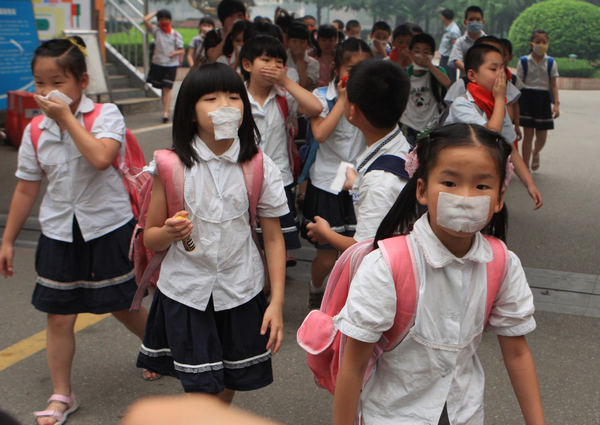Haze from burning straw swathes cities in smog
Updated: 2012-06-13 07:58
By Cang Wei and Song Wenwei in Nanjing (China Daily)
|
||||||||
|
 |
|
Students at the Yucai Primary School in Wuhan, capital of Hubei province, on Monday cover their mouths with pieces of cloth to prevent themselves from inhaling smog caused by straw burning. Jin Siliu / for China Daily |
Brownish-yellow smog caused by burning straw has blanketed many Chinese cities in recent days as the harvest season approaches.
On Monday, seven cities in Central China's Hubei province, including the provincial capital Wuhan, were shrouded in heavy smog, according to the provincial environmental protection department.
In Wuhan, the levels of PM10 (particulate matter with a diameter smaller than 10 micrometers) reached 574 micrograms per cubic meter at 2 pm, far exceeding the permissible level of 150 micrograms per cubic meter.
Cities in East China's Jiangsu province, such as Nanjing, Huai'an and Taizhou, have also witnessed heavy smog in the past few days.
According to Green Stone, an environmental protection NGO in Nanjing, the inhaled pollutant exposure from spending 24 hours outdoors in Nanjing on Sunday is equal to the amount that from smoking 15 packs of cigarettes.
Many people living in the densely populated areas in Anhui, Shandong and Henan provinces also choke on burning straw smoke during the harvest season.
Poor visibility caused by smog led to a chain collision on an expressway in Mengcheng, Anhui province, on Saturday night, killing 11 people and injuring 59 others.
"Burning straw after harvest is common in China's rural areas, because it's an easy way to dispose of agricultural waste," said Chen Tingting, a publicity official of Qinghe township in Shandong.
"The environmentally friendly way to deal with straw, such as making methane or fertilizing the soil by burying the straw deeply, requires extra money, technology and manpower," said Chen. "Many farmers lack the technology, and don't want to spend money on disposing of straw."
"If farmers don't burn the straw, they can't grow rice in time, because straw will float on the water and prevent rice seedlings from getting enough oxygen, which will kill the seedlings," Chen said.
"China has put forward measures to control straw burning since 2000, but some haven't achieved the desired results," said Qiu Huanguang, a researcher from the Chinese Academy of Sciences' Center for Chinese Agricultural Policy.
"One main reason is that there is not enough publicity about the harm that straw burning causes, so farmers simply burn it without being aware of potential damage to their health," Qiu said.
According to Yang Xiongnian, deputy director of the science, technology and education division under the Ministry of Agriculture, 41.7 million Chinese families had become methane users by the end of 2011.
But Qiu said that although technologies are provided to some farmers to build methane-generating equipment, aid to maintain and fully use the equipment is insufficient.
She said that the local government has paid great attention to limit straw burning by sending more than two-thirds of its employees to farming areas.
"They've worked every day until midnight for two weeks," said Chen. "But they dare not work alone, because then they might get beaten by the farmers."
Authorities in Jiangsu province also have taken measures to reduce the burning of waste straw.
The Nanjing government and the provincial environmental protection department sent eight supervision teams to all cities in Jiangsu to inspect straw burning on Sunday.
"But it is hard to catch farmers red-handed because they often burn straw in the evening. The supervision is very difficult to carry out," said Hong Shi, who works for Lianyungang environmental protection bureau's publicity department in Jiangsu province.
"To avoid supervision, many farmers choose not to burn straw during daytime but in the evening," Chen said.
"Giving more publicity to the harm of straw burning is crucial, and farmers should be given more technology," said Qiu. "Subsidies should also be given to purchase more advanced agricultural machines that produce less straw.
An Baijie contributed to this story.
Contact the writers at cangwei@chinadaily.com.cn and songwenwei@chinadaily.com.cn

 Relief reaches isolated village
Relief reaches isolated village
 Rainfall poses new threats to quake-hit region
Rainfall poses new threats to quake-hit region
 Funerals begin for Boston bombing victims
Funerals begin for Boston bombing victims
 Quake takeaway from China's Air Force
Quake takeaway from China's Air Force
 Obama celebrates young inventors at science fair
Obama celebrates young inventors at science fair
 Earth Day marked around the world
Earth Day marked around the world
 Volunteer team helping students find sense of normalcy
Volunteer team helping students find sense of normalcy
 Ethnic groups quick to join rescue efforts
Ethnic groups quick to join rescue efforts
Most Viewed
Editor's Picks

|

|

|

|

|

|
Today's Top News
Health new priority for quake zone
Xi meets US top military officer
Japan's boats driven out of Diaoyu
China mulls online shopping legislation
Bird flu death toll rises to 22
Putin appoints new ambassador to China
Japanese ships blocked from Diaoyu Islands
Inspired by Guan, more Chinese pick up golf
US Weekly

|

|







